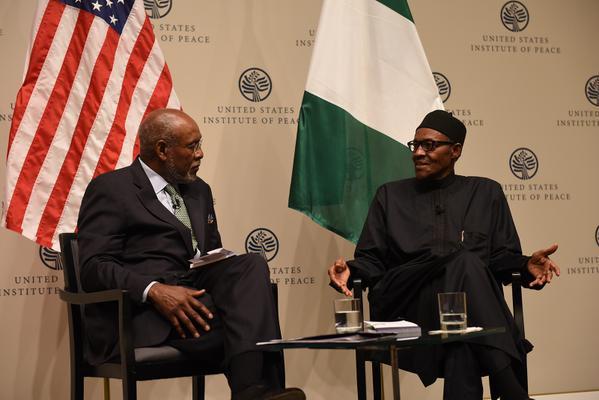 President Muhammadu Buhari, on Wednesday, said the blanket application of Leahy Laws by the United States of America has hindered Nigeria from recording appreciable successes against the Boko Haram insurgents ravaging the northeastern part of Nigeria.
President Muhammadu Buhari, on Wednesday, said the blanket application of Leahy Laws by the United States of America has hindered Nigeria from recording appreciable successes against the Boko Haram insurgents ravaging the northeastern part of Nigeria.
Buhari, while addressing a session at the United States Institute of Peace (USIP), said “Regrettably, the blanket application of the Leahy Law by the United States on the grounds of unproven allegations of human rights violations levelled against our forces has denied us access to appropriate strategic weapons to prosecute the war against the insurgents. In the face of abduction of innocent school girls from their hostels, indiscriminate bombings of civilians in markets and places of worship, our forces have remained largely impotent because they do not possess the appropriate weapons and technology which they could have had, had the so called human rights violations not been an obstacle.
“The application of the Leahy law amendment by the U. S. Government has aided and abetted the Boko Haram terrorist group in the prosecution of its extremist ideology and hate, the indiscriminate killings and maiming of civilians, in raping of women and girls, and in their other heinous crimes. I believe this is not the spirit of the Leahy Laws.”
Named after its principal sponsor, Senator Patrick Leahy of Vermont, the Leahy Law or Leahy amendment is a U.S. human rights law that prohibits the U.S. Department of State and Department of Defense from providing military assistance to foreign military units that violate human rights with impunity.
The President, however, added that he believed that the US did this ‘unwittingly and ‘unintentionally’, while also making it known that he believed that “American people cannot support any group engaged in these crimes.”
He, therefore, urged the American government to urgently review the application of the laws against Nigeria. He explained that delays would further empower Boko Haram insurgents to commit more dastardly crimes against Nigeria and her neighbours.
“I therefore strongly appeal to both the Executive Arm and the US Congress to examine how the US Government can provide us with far more substantial counter-terrorism assistance with minimal strings. The longer we delay, the deadlier the Boko Haram gets. At all events, we have re-written the rules of engagement protecting the rights of combatants and in particular safeguarding civilians in theatres of conflict.”



